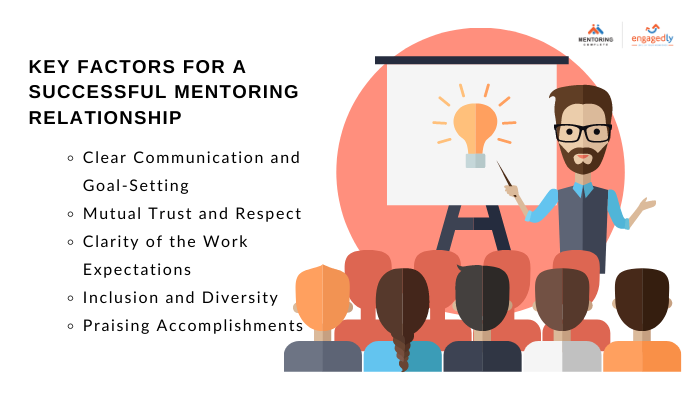
In the current challenging times, businesses ought to proactively invest in fostering strong connections between mentors and their protégés. This close connection is crucial because it not only adds flavor to the up-skilling journey but often kick-starts amazing career makeovers.
Let’s dive into some intriguing, handy figures that illuminate the efficacy of these bonds: Believe it or not, over 80% of mentors/mentees have found stronger bonds across departments and the entire business-courtesy of mentoring. Plus, their anxiety levels dropped, and inspiration flowed both ways!
Furthermore at CNBC, an astounding 91% of the workforce with a mentor mentioned they felt cheery with their job, while 57% chimed in about being extremely content with their work life. And lastly, most employees found valuable networking opportunities with mentoring sessions.
Essentially, with such relationships, both sides reap multifarious benefits. Elaborately put, mentors enjoy personal development, feeling content, and widened circles while mentees are in for a treat with guidance and tips tailored just for them.
With these in perspective, this blog post aims to serve as the mentor-mentee relationship guide-a lighthouse, shedding light on essentialities for mentor-mentee partnerships and factors for establishing strong mentors/mentees connections.
Understanding the Mentor-Mentee Relationship
To help everyone comprehend the mentor-mentee relationship, in this section, our comprehensive mentor-mentee relationship guide focuses on the hereunder aspects:
- Definition of mentors and mentees-who are they
- Different types of mentoring relationships
A Quick Look at the Definition of Mentors and Mentees:
Mentors are like compassionate, learned guides, packed with experience and insight, excited to pass their wisdom on to keen apprentices, while mentees soak up knowledge from mentors to apply them at the workplace in different circumstances–under their gurus’ watchful eye.
You will spot mentor-pupil bonds in all walks of life, like at the office, on self-improvement routes, or at hangouts, discussing handy work tricks or sharing specialized knowledge.
Different Types of Mentoring Relationships:
Mentoring relationships can be built on different levels and they are:
- Professional Level: In a professional mentor-mentee relationship example, you might observe a senior manager offering guidance to a junior employee or vice-versa (reverse mentoring) while helping them navigate company processes and meet performance metrics.
- Personal Level: In personal mentorship, the focus is on helping mentees to enhance their personal life along with work by dishing out tips on juggling time or setting targets.
- Emphasis on Knowledge Transfer at Any Level: This consists of exchanging unique insights on a specific topic or skill set, where experts transfer their wisdom to others who seek it.
Each level has its own mentor-mentee relationship guidelines and following them can lead to meaningful connections that support everyone involved.
Read Also: 4 Characteristics of a Quality Mentoring Match
Key Factors for a Successful Relationship

To forge a fruitful mentor-mentee bond, there are certain essential aspects a company needs to weigh in.
Clear Communication and Goal-Setting:
Often, miscommunication can lead to dampened team spirits, unnecessary confusion, and increased doubt, throwing a wrench in the works when it comes to overall productivity-a situation companies aim to sidestep. In fact, research supports this, revealing that weak communication negatively affects 45% of employees’ faith.
Hence, fostering open dialogue is crucial, as both parties get to discuss candidly; share their valuable ideas, and set goals accordingly. Through open communication, mentors can catch wind of their mentees’ worries or aspirations and dish out supportive pointers customized to their situation.
For instance, when mentees face a tough situation regarding a work process or setting goals, they can approach mentors. These mentors can provide practical approaches to navigate the situation and share quick tricks to achieve professional growth objectives.
Mutual Trust and Respect:
Employers can’t undermine mutual respect and trust among staff, as without it employees may not feel like valued team players. So this requires both parties to chip in time and effort as they sail through a mixed bag of shared experiences.
A few tricks to pull this off are hosting more team huddles and giving the green light for collaboration, as well as cultivating a learning atmosphere. Moreover, opening up channels for managers and their team members to share feedback and converse can really cement that trusting bond.
While doing so, mentors should be empathetic, respecting individuals’ working styles and approaches–keeping aside their own values or assumptions.
Clarity of the Work Expectations:
Though nobody’s a fan of being bossed around, employees for sure appreciate learning the ins and outs of their work roles and mentor-mentee relationship goals. So letting new staff in on the ropes and breaking down the brass tacks of their duties can work wonders for a company’s lasting success through mentors.
Correspondingly, Gallup highlights that workforce involvement takes a nosedive without clear expectations and when they can’t pursue tasks that play to their strengths.
Similarly, Gen Z and Millennials alike gravitate towards businesses that transparently lay out their demands, pass on the baton of duties, and subscribe to the notion of striving for a silver lining.
Here is where mentors can impart their wisdom to Gen Z and Millennials and help them understand the expectations from their contributions. Also, they can discuss mentees’ aspirations and play a part in their realization. This would help them to gel together and aid mentees to reach greater heights.

Inclusion and Diversity:
Successful mentor-mentee relationships should consider individual differences while fostering an environment where diversity is celebrated as an opportunity for growth.
In a diversified firm, a workforce hail from diverse walks in life. There’re individuals from different cultures, ages, religions, linguistic varieties, genders, and LGBTQIA+ members. Undeniably, more obvious and hidden traits set workers apart. However, the listed factors could be deemed as general causes of creating diversity rifts that mentors could address while mentoring mentees from diverse backgrounds.
Interestingly, diversity has its own merits for firms and hence mentors would work on this area to forge a better relationship with mentees.
And not surprisingly, companies with pro-diversity approaches had the upper hand and aced the 2008 financial crisis. Undoubtedly, the rationale behind this stands out: companies with increased variety bring about higher degrees of ingenuity.
And referring to inclusion: it’s all about feeling at home and forming a tight-knit community in the work scene, building solid bonds between teammates. An organization that nails inclusion sets up a place where people can’t wait to bring their genuine selves and express diverse thoughts, creating real bonds with others.
Here is where again mentors can play a crucial role by focusing on addressing inclusion issues after discussing them with mentees. By doing so, they can build a robust connection with mentees-one of the recommended ideas from the mentor-mentee relationship guide.
In fact, a remarkable 80% of survey participants reckon an all-inclusive atmosphere is crucial while making a decision on their future employer. Further, employees who can let their hair down at work are 42% less prone to have the itch to switch jobs within a year.
Praising Accomplishments:
Mentors hold the invaluable prospect of observing mentees’ development over time, as they are the primary facilitators of their learning journey. But their duty doesn’t end here–there is more they need to do to encourage mentees!
Specifically, give credit to young talents and senior members when they deserve it; especially by showing appreciation for all the relentless efforts put forth in attaining those milestones.
In doing so, this act bolsters work engagement; reaps substantial rewards for organizations in the long haul, and importantly, helps to build strong connections between mentors and their pupils.
Interestingly, nearly 68% of workers in companies with solid praise cultures would give it a thumbs-up as an awesome workplace.
Finding The Right Mentors For Mentees-Objectives and Medium

It is essential to find out right mentors for mentees so that their thinking wave lengths match and guides can effectively resolve issues faced by young talents.
Identifying Mentees’ Needs and Objectives: Kicking off the mentor search, it’s key to pinpoint the mentee’s goals and what they’re after. This process entails evaluating areas in which the mentee requires improvement or guidance and setting specific, measurable goals. By doing this, mentees get the big picture of what they’re shooting for in the mentorship bond. For instance, an aspiring leader might team up with a seasoned mentor who’s managed multiple departments.
Reaching Out To Potential Mentors Through Virtual Platforms: Mentees can be connected with the right mentors through virtual mentoring platforms, brimming with diverse resources. Utilizing virtual platforms like Mentoring Complete, mentors and mentees can connect and join forces for enhanced results.
Moreover, if the mentorship process transpires online, it enables both parties to bridge any geographical divide, allowing seamless interaction regardless of location.
Read Also: Getting familiar with Modern Mentoring 2.0
Conclusion
By following the suggestions shared in this mentor-mentee relationship guide, both parties will benefit from shared information detailed with examples.
Elaborately put, a strong mentor-mentee relationship is vital for both parties from personal and professional growth perspectives. This majorly depends upon the mentors–that is, how well they are able to address mentees’ worries and help them navigate through tough workplace scenarios. Another aspect is connecting mentees to the right mentors who understand their opinions and situations
As aforementioned, Mentoring Complete can be a handy virtual platform for companies as it is equipped with multifarious features and options for pairing mentors-mentees. So get the pairing right with the modernized platform and kickstart a strong relationship so that they and your company can flourish together.
Gain more clarity ⤵
Frequently Asked Questions
Q. What does the mentor-mentee relationship guide provide?
Ans. The guide offers valuable insights, tips, and strategies for establishing successful and lasting mentor-mentee relationships.
Q. Who can benefit from the mentor-mentee relationship guidelines?
Ans. Individuals seeking support in their career or personal lives, mentors looking to guide mentees effectively, and organizations aiming to foster growth among team members.
Q. How will the ultimate guide for the mentor-mentee relationship improve the mentoring relationship?
Ans. It equips you with best practices in communication, goal setting, development plans, and navigating challenges in mentor-mentee relationships.
Subscribe To The Mentoring Complete Newsletter
1 Comment
[…] knowledge and experiences, coupled with patience and encouragement, is crucial in cultivating a mentor-mentee relationship. Ultimately, mentoring skills involve a combination of interpersonal, communication, and leadership […]
Comments are closed.